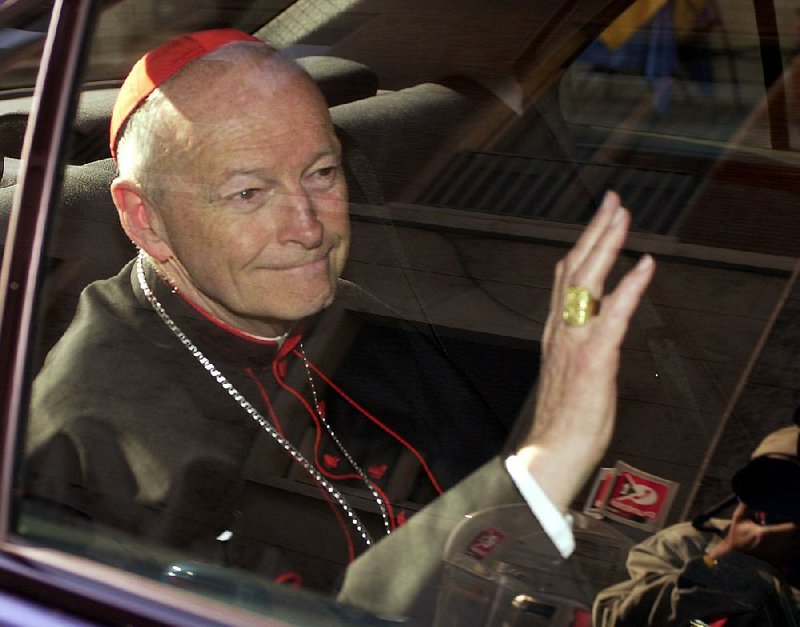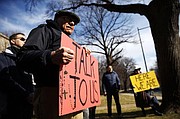Pope Francis has expelled Theodore McCarrick, a former cardinal and archbishop of Washington, from the priesthood after the church found him guilty of sexually abusing minors and adult seminarians over decades, the Vatican said Saturday.
It appears to be the first time a cardinal has been defrocked in a sexual-abuse case -- marking a critical moment in the Vatican's handling of a scandal that has gripped the church for nearly two decades. It is also the first time an American cardinal has been removed from the priesthood.
In a short statement Saturday, the Vatican said a canonical process had found McCarrick guilty of two charges: soliciting sex during confession, and committing "sins" with minors and adults, "with the aggravating factor of the abuse of power."
The defrocking marks the conclusion of a private Vatican proceeding and comes just days before Pope Francis plans to gather bishops from around the world for an unprecedented meeting on abuse.
It also finalizes the downfall for a figure who entered the priesthood six decades ago, climbed the ranks of the faith and earned influence and honorifics -- before becoming a symbol of the church's struggle to root out abuse in its highest ranks.
Robert Ciolek, who has said he was abused by McCarrick in the 1980s when Ciolek was a young seminarian and later a priest, said Saturday that he viewed the defrocking "as a very positive step."
He added, "It signals that Rome may finally be serious about taking matters like abuse of power very seriously, with grave consequences for those who engage in that conduct."
The decision against McCarrick is known formally as a "dismissal from the clerical state." The sentence is considered by the Catholic Church to be the most severe form of canonical punishment for a cleric -- worse than excommunication, which is temporary and lasts only as long as a person persists in sin.
McCarrick, 88, accused of sexually abusing three minors and harassing adult seminarians, likely won't face criminal prosecution because the allegations that have been made public relate to crimes that would be beyond statutes of limitations in the U.S. jurisdictions where they are said to have occurred.
In its statement Saturday, the Vatican said its Congregation for the Doctrine of the Faith had found McCarrick guilty of the charges on Jan. 11. Then, on Wednesday, the Vatican "considered the recourse" McCarrick presented but confirmed the original decision -- a determination that McCarrick was informed of on Friday. Pope Francis has affirmed the decision, meaning it is final.
While the Vatican has defrocked hundreds of priests over the sexual abuse of minors, few of the church's leaders have faced severe discipline. The decision to laicize, or defrock, McCarrick is "almost revolutionary," said Kurt Martens, a professor of canon law at the Catholic University of America.
"Bishops and former cardinals are no longer immune to punishment," Martens said. "The reverence that was shown in the past to bishops no longer applies."
The expulsion of McCarrick is the most serious sign to date that Francis is addressing the clerical sex-abuse crisis, after facing criticism that he has moved too slowly. In October, the pope laicized two retired Chilean bishops accused of sexually abusing minors. In December, he removed two top cardinals from his powerful advisory council after they were implicated in sexual-abuse cases.
Since last summer, when allegations against McCarrick first surfaced, the church has been plunged into a new chapter of the scandal. State and federal investigations across the United States are now underway, and each week a new diocese releases names of priests credibly accused of sexual abuse.
A New York Times investigation last summer detailed settlements paid to men who had complained of abuse when McCarrick was a bishop in New Jersey in the 1980s, and it revealed that some church leaders had long known of the accusations.
Francis accepted McCarrick's resignation from the College of Cardinals in July and suspended him from all priestly duties. He was first removed from ministry in June, after a church panel was said to have substantiated a claim that he had abused an altar boy almost 50 years ago.
McCarrick was long a prominent Catholic voice on international and public policy issues, and he was a champion for progressive Catholics active in social-justice causes.
The Archdiocese of Washington said in its own statement, "Our hope and prayer is that this decision serves to help the healing process for survivors of abuse, as well as those who have experienced disappointment or disillusionment because of what former Archbishop McCarrick has done."
James Grein, who told The Times that he was 11 when McCarrick began a sexually abusive relationship with him, said in a statement Saturday: "For years I have suffered, as many others have, at the hands of Theodore McCarrick. It is with profound sadness that I have had to participate in the canonical trial of my abuser. Nothing can give me back my childhood."
He added: "With that said, today I am happy that the Pope believed me. I am hopeful now I can pass through my anger for the last time. I hope that Cardinal McCarrick will no longer be able to use the power of Jesus' Church to manipulate families and sexually abuse children."
Grein said pressure must be put on U.S. state attorneys general and on senators to change the statute of limitations for abuse cases.
"Hundreds of priests, bishops and cardinals are hiding behind man-made law," he said.
Cardinal Daniel DiNardo, president of the U.S. Conference of Catholic Bishops, said: "The Holy See's announcement regarding Theodore McCarrick is a clear signal that abuse will not be tolerated. No bishop, no matter how influential, is above the law of the church."
On Saturday, the Vatican spokesman, Alessandro Gisotti, told reporters that the Congregation for the Doctrine of the Faith had extended McCarrick a penal process in which "all his rights were respected" and that his "lawyers played an active role in the course of some of the interrogations."
McCarrick's civil lawyer, Barry Coburn, said Saturday that his client had no comment on the defrocking.
Coburn declined to say whether McCarrick would stay at the residence in Kansas where he moved after Francis ordered him to live in penance and prayer while the investigation into his actions continued.
But the Salina, Kan., diocese, said that "Mr. McCarrick will continue to reside at the St. Fidelis Friary in Victoria until a decision of permanent residence is finalized."
In addition to bishops arriving for the sex-abuse meeting, victims-rights advocates are also converging on Rome. They are demanding that Francis, other Vatican officials and bishops elsewhere come clean about how McCarrick managed such a meteoric rise through church ranks despite reports about his sexual life.
"The pope has known from the earliest days of his papacy, or he should have known, that ex-Cardinal McCarrick was a sexual predator," said Anne Barrett Doyle, an advocate at BishopAccountability.org.
"He has a resistance to removing bishops, and he also has a tolerance for bishops who are sexual wrongdoers," Doyle said Saturday near St. Peter's Square at the Vatican.
Walking with Doyle was Phil Saviano, a board member of BishopAccountability.org, and a survivor of sexual abuse by a priest. While calling McCarrick's defrocking "ultimately a good thing," he said the punishment should have been meted out long ago.
He said he hoped Francis isn't "throwing a bone to his dissenters in an attempt to quiet everybody down. And then McCarrick will be the one and only, because there are certainly many others who have allegations against them who should face some accountability."
A conservative lay group, The Catholic Association, said in a statement that much more must be done to hold accountable "those in the church hierarchy who looked the other way as McCarrick rose through their ranks" and to ensure that priestly celibacy is restored and youths are safeguarded from sexual abuse.
Information for this article was contributed by Elizabeth Dias and Jason Horowitz of The New York Times; by Frances D'Emilio, Nicole Winfield and Trisha Thomas of The Associated Press; and by Chico Harlan and Stefano Pitrelli of The Washington Post.
A Section on 02/17/2019


